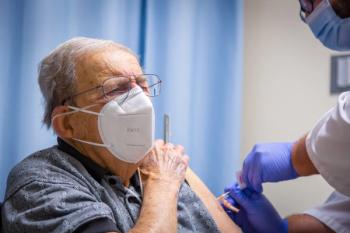
This month features asciminib (Scemblix), pilocarpine HCI ophthalmic solution (Vuity), and amphetamine (Dyanavel XR).

This month features asciminib (Scemblix), pilocarpine HCI ophthalmic solution (Vuity), and amphetamine (Dyanavel XR).

Data from 4 analyses show that individuals treated with the drug achieved non-inferior vision gains compared with aflibercept.

Both data sets confirm previously announced results showing that the boost protects against the variant.

Having such a program spearheaded by pharmacists has helped show the public the vital roles that pharmacists play.

Early-stage melanomas at risk of spreading secrete the TGFβ2 growth factor, which causes the downregulation of the AMBRA1 and Loricrin proteins.

The FDA also expanded the pediatric emergency use authorization for remdesivir to include the treatment of non-hospitalized pediatric patients at high risk of disease progression.

This month's generic product news features generics for Robinul, Decadron, and Samsca.

For patients with type 1 and type 2 diabetes, decisions around the selection of glucose meters can be difficult as there are several brands and types of meters available.

This recent research also found that those who received the Moderna vaccine were less likely to be hospitalized compared to recipients of the Pfizer-BioNTech vaccine.

Kovaltry temporarily replaces the missing clotting Factor VIII in patients with hemophilia A.

Norman Lepor, MD, a cardiologist and clinical investigator in the phase 3 clinical program for inclisiran (Leqvio; Novartis), discusses the burden of ASCVD in the country today.

Several common houseplants present in homes year-round due to their low maintenance requirements and environmental adaptability are far more toxic than many may realize.

Tau protein, plaque, and brain waves maybe the solutions to treating the progressive condition.

New trial results showed statistically significant improvements in overall survival and progression-free survival.

Additionally, the results also showed a 25% reduction in the risk of disease progression or death with durvalumab plus chemotherapy.

Stanford Medicine investigators were able to estimate who is most likely to land in the hospital.

Results of an analysis show that 3 doses of either Oxford/AstraZeneca COVID-19 or Pfizer BioNTech COVID-19 neutralizes the variant.

In a presidential advisory, the American Heart Association says that individuals thought to be having an allergic response to the injection may instead by experiencing a cardiac reaction.

Study results demonstrate that ProBiotix’s probiotic strain can significantly reduce low-density lipoprotein levels.

Glioblastoma can be very difficult to treat and a cure is often not possible.

Norman Lepor, MD, a cardiologist and clinical investigator in the phase 3 clinical program for inclisiran (Leqvio; Novartis), discussed inclisiran’s mechanism of action and how it supports LDL-C management for patients with ASCVD.

With integrated specialty pharmacies enabling health systems to improve patient outcomes and lower total medical costs, every hospital will need a solution to support the growing number of patients on outpatient specialty medications.

Properly implemented CGMP should not be seen as a regulatory burden but a remedy to poorly compounded drugs.

Clinical benefits were seen across subgroups, including patients with squamous and non-squamous lung cancer subtypes, and regardless of PD-L1 levels.

Shreejit Nair, senior vice president and life sciences market business lead at CitiusTech, discussed what the impact of the pandemic has been on the advancement of data interoperability in health care.

A sizable number of clinical trial participants say they had at least 1 AE, with fatigue and headaches the most common.

The analysis describes cost-effective options for individuals without symptoms and recommends isolation strategies to help policymakers safeguard against resurgences.

Agency aims to allow electronic prescriptions for schedule II to V drugs between registered retail pharmacies on 1-time basis for initial fill.

Finding alternative means to promote interleukin 25 could enhance the benefits of fecal transplants in patients with recurrent C. difficile infections.

Patients can sometimes develop Guillain-Barre syndrome after having a recent respiratory illness or digestive tract infection and, in rare cases, after receiving certain vaccines.